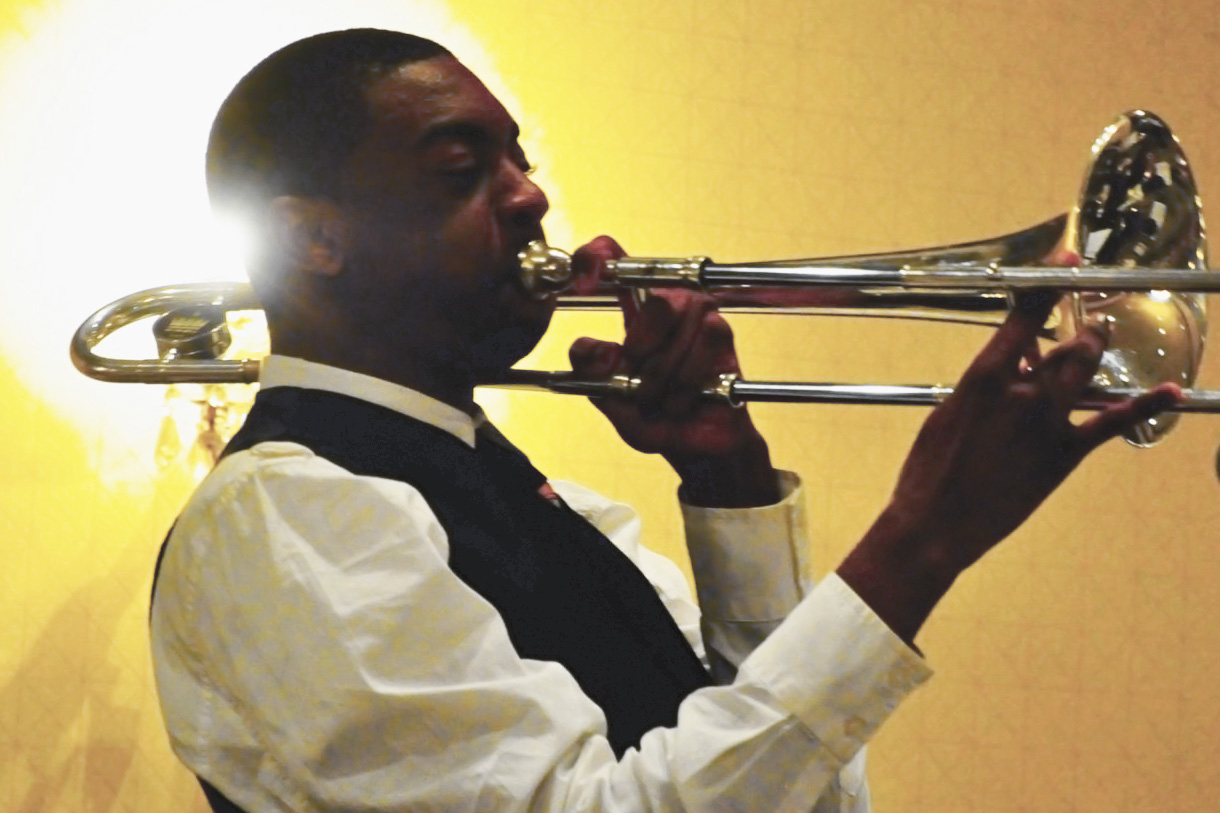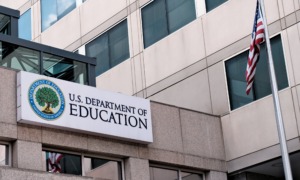LOS ANGELES — When Jaron Wright was a freshman in Compton’s Centennial High School music program in the fall of 2011, the program included a modest marching band and a limited number of musical instruments and supplies.
“It was small, it was average,” Jaron said. “We did not have the funds and enough people to really have a dedicated band.”
He had already learned to play the baritone horn, cello, trombone, flute and ukulele as a student at Bunche Middle School. But at Centennial he was initially unable to develop his musical skills outside the marching band. Then, his music teacher at Bunche, Manuel Castaneda, who Jaron calls “Mr. C,” began working as Centennial’s music director in the fall of 2012.
At Centennial, Castaneda wanted to start string and jazz ensembles — which exist at two of the middle schools that feed into Centennial — for students who had been in those programs.
“So many students who wanted to play music in high school never enrolled in the marching band because they either couldn’t or didn’t want to play marching band instruments,” Castaneda said. “There was no place for them in the music program at Centennial.”
But the school couldn’t afford to expand the program.
Then, in Wright’s junior year, the music department was surprised with a $50,000 check.
That changed everything. And it came from one of the school’s most notable alumni — hip-hop artist Kendrick Lamar.
Lamar had left the check-in school principal Jesse Jones’s office in December 2013. When Jones made the announcement to the music students during a marching band rehearsal, Jaron was left speechless.
“My first reaction was ‘No way!’ ” Jaron said. “We have never received a donation that large and it was from our very own Kendrick Lamar, who came from the same place as us.”
Since the donation, Castaneda has been able to establish both string and jazz ensembles and buy dozens of new instruments and music supplies. He was also able to fund a student trip to the WorldStrides Heritage Performance Programs San Francisco Music Festival, where the school’s jazz band performed.
“We are so fortunate to have Kendrick’s support,” Castaneda said. “I don’t think our music program would be what it is today if it wasn’t for the boost that he gave us.”
Lamar, who recently won an award from the California State Senate, has been praised for donating hundreds of thousands of dollars to the Compton’s school district’s sports, after-school, music and other programs, in addition to local charities.
State Sen. Isadore Hall III called Lamar the voice of a new generation of urban youth, who demonstrates the best of what it means to work hard, do well and give back to his community.
“I always thought how great the opportunity would be to give back to my community off of what I do in music,” Lamar said at the ceremony. “To … have these young kids look at me as some type of inspiration is an honor.”
For the kids in Centennial High School’s music program, like Jaron, Lamar has undoubtedly served as an inspiration.
“He’s a role model and really cares about giving back to his community,” Jaron said. “His music talks about him coming up and succeeding from when he was younger. That alone connects with and inspires youth, because we understand it and we know that struggle.”
A popular musician’s ability to use their position and their music as a vehicle to address social inequalities is a historical practice. Associate Professor Shana L. Redmond of American Studies and Ethnicity at the University of Southern California has studied this practice and the various ties between music and social movements. She said musicians like Lamar are uniquely capable of stirring social movements because they make us listen.
“Listening differently to the music around us encourages us to live differently and that challenges systems of oppression,” Redmond said. “As a musician, Lamar makes people think about and debate issues of inequality, racism and violence. He is a model for the transformative work that music can do in the world not only because he donates his money, but because he invests in his craft and uses it for the benefit and liberation of others.”
With many songs addressing issues of racism like “The Blacker the Berry,” where Lamar raps, “I’m African-American … I’m black as the moon … you hate me, don’t you? You hate my people, your plan is to terminate my culture … you vandalize my perception but can’t take style from me …” much of Lamar’s music encourages oppressed groups to rise up.
“Music is motivation, it’s a sense of camaraderie,” Redmond said. “Popular music is a lifeline for people, and music like Lamar’s gives a platform to communities whose needs and desires are too often silenced.”
In a community like Compton, which is often denigrated as a crime and gang-ridden area, Castaneda said he is glad Lamar’s music is influential for Centennial’s students.
“[Kendrick] doesn’t portray himself as a hardcore, gangbanger thug … we have enough of those in Compton,” Castaneda said. “He’s a good kid … you can rap about positive things … not everything is ‘Shoot ‘em, kill ‘em’ and all that.”
Castaneda also noted that the funds Lamar has donated to the music program have helped to bring about a more positive image of Compton.
“We get a lot of negative publicity here and we want to go out there and show people that Centennial is a mecca for music,” Castaneda said. “We want to show that there are educated and well-mannered youth who appreciate art in Compton.”
Jaron Wright, now 18, has won a full-tuition college scholarship for music to the University of Arkansas. He is excited about the future of Centennial’s music program.

Centennial High School
Jaron Wright.
“We set the standard for the future students, and I’m glad we can leave a positive legacy here at Centennial,” Jaron said. “Considering we live in Compton and don’t have a lot of academic achievement, the music program alone brings life to our school. We pump the students up and when they see us performing, they’re excited by what we do and want to come to school to see us, go to our parades, our concerts.”
Jaron said he is thankful for musicians like Kendrick Lamar who work to connect to and aid underserved communities like his own.
“You can connect to anyone through music … it’s a massive entertainment,” Jaron said. “Not everyone can sing or dance or rap. But for those that can, it’s so important to perform from the heart because people connect with that and that can make real change.”


























